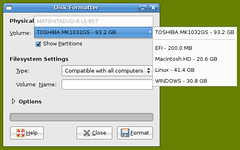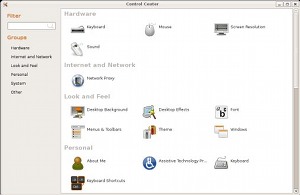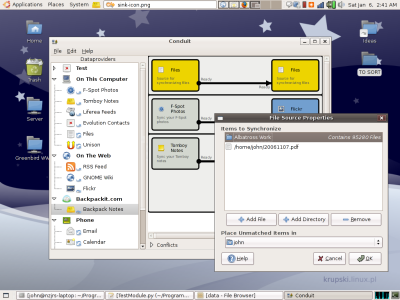With the great help of those on the Ubuntu forums XGL/Compiz is looking greater than ever. The Updated Compiz adds the opacity plugin and darkens the background for the expose effects. But better than that, the Updated XGL removes all the flicker that I was seeing.
There are a number of lively discussions currently going on in desktop-devel with regard to new module proposals [1]. This reminded me of a few projects I used to follow that I have not heard from in a while. Hoping not to offend any of the developers I therefore ask,
What ever happened to?
-
Gnome Formatter
A HAL pretty formatting utility, so I may finally easily format my USB keys. Description here, and here

-
GSmartMix + PulseAudio + LibSydney
A dream bunch of projects providing policy for sound devices. GMartMix lives between gstreamer and pulseaudio (i hope...) to allow applications to mute, pause, and have per application volume control, although the latter may be the domain of Pulseaudio. LibSydney said to replace esd in GNOME (finally, down with cruft).
-
Mathusalem: Long running task manager
This SOC2006 project built sufficient buzz that KDE has now acquired an equivalent in KDE4. With Nautilus currently being broken to integrate the great new gvfs work, perhaps this would be a good time to play
-
New gnome-panel bling
Ohhh shiny. Im happy to see this come up on ddl, users like shiny things. Some more gnome-panel ideas here.
-
Libslab, Tiles and the New UI Metaphor, including Gnome Main Menu.
-
Gnome-control-center single window mode.
I know it met with resistance when it was introduced but I quite liked it!

-
GtkApplication and GtkUnique
Perhaps GtkApplication is a smart place to put the window DND stuff (now that nautilus supports XDS)
-
New GNOME Session Code
TOPAZ type infrastructure which may allow saving tasks to a file, or even a project or task oriented desktop.
-
Metacity Compositor
Kwin is shipping with a compositor, as is the xfce window manager. It would be a shame to have nothing comparable (yes I am aware of Compiz, and sometimes it hurts to use)
Anyway, its great to see the action on ddl, and the excitement surrounding GNOME again. I look forward to the next release. I will be releasing a Conduit 0.3.9 (the RC before 0.4.0) this weekend, and here is a hint about my next blog post: Conduit as a blessed GNOME dependancy, how can we integrate Sync into the desktop?
[1] I am also hoping that tracker and/or xesam gets proposed this cycle.
So its been a while since I have posted but there is some interesting news to report;
-
Conduit has a new developer - confusingly also named John
-
I am speaking at Linux.conf.au both at the GNOME Miniconf and the Main conference
-
I have some interesting Topaz style demos to show soon
-
Conduit 0.3 is going to rock
-
Opensync will be supported (to some degree)
-
The UI is starting to really ROCK, and improved treeview to display dataproviders, and improved canvas performance.
-
I have been working on a python binding to evolution. It is starting to reach the state of being useful and will be supported in the next release. I hope that this library could one day be included in GNOME.

I recently came across the post; why student programmers rant about business students with ideas. Putting my ideological belief in FOSS aside, I think it eloquently describes why I chose to return and pursue a PhD after a year spent studying engineering management (like an MBA - for those North American folks).
I also think it is highly applicable to FOSS. Many successful FOSS projects are born from engineers, the 'decision to execute' has already been made. As the article mentions, 'leadership and the ability to make decisions _is _valuable, but only in groups with realizable ability to execute'. As a FOSS project evolves, the (normal?) combination of a BFDL and the constant freedom to fork keep the project relatively free of the ownership style disputes described in the post.
In reading the post and its comments, its also refreshing to see a discussion on the internet so free of rudeness.
[1] The terms engineer and programmer can be used interchangeably, in this context. They are both highly skilled, creative professions, commonly only recognized as such by their respective peers.
[2] Im obviously not so naive as to rule out the influence of money on all of this. I just consider it a baseline, and a gross generalization, that monetary incentives are less important to creative professions than to those who pursue an MBA.
Well, all the cool kids are doing it so I thought that I better have a go. XGL and compiz run on my integrated i915 video without problems and I am amazed at the speed and quality for pre-alpha software.



After all of the hassle of building Compiz and friends (excluding XGL) from CVS I found this and this (includes new opacity plugin).





